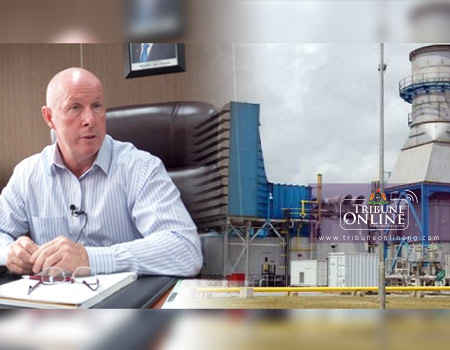
The management of Egbin Power Plant has stated that it will double the capacity of the power plant from the current 1320MW to 2740MW by the year 2020.
Addressing journalists during the visit of United States Ambassador to Nigeria and some Congressmen to the premises of the company, the Managing Director and Chief Executive Officer, Egbin Power Plant, Dallas Peavey, stated that “We want to double the capacity by 2020, which we have started talking to international organizations to help with that. We are talking to General Electric (GE) and some other partners that will work with us to achieve that. We are looking at around $1.5 billion investment to achieve this.”
He said just after the takeover in 2013, the plant was operating below 30 per cent capacity and had some challenges, but now “we are improving on it and operating not on Nigeria or US standard but on international standards acceptable all over the world.
“We have invested over $400 million in this facility since we took over.
“When we first came back, it was in a deplorable state and in fact 80 per cent of the facilities and buildings were closed down as it was unsafe and unsanitary. But upon takeover in 2013, we were on 240 megawatt when we first took over.
“We now have more than a thousand employees, we now have staff living here, we have more than 500 residential houses, hospitals, clinics and schools are all available here.”
Furthermore, he posited that the place was built by the Japanese 30 years ago and facilities have become unusable.
“The unit 6, which is now our best unit, has not been operational for its over 30 years history, but now, it has restored and becoming one of our best unit and even going beyond the capacity it was created for. The control room when we first came was also not in a good state, but now fully to an optimal level.
“Everything is now working and fully usable. We have done major changes and overhaul of facilities. We have also employed 107 engineer graduates from universities in Nigeria. We have invested heavily on Egbin. In the next month, we will be building a training facility for Egbin.
“Even the inventory are now fully working, as it has been made better. All the waste that was usually disposed into water, have now been worked on and corrected.
“We are working on training, simulation. We have installed gas meters to know amount of energy used, same with the type and quality of gas. We are also talking to an international company (GE) to help us with installation, acquire pieces of equipment that are hard to find, perform overhaul, transmission evacuation and also to help us identify problems that could be worked on.
“We are now operating at 90 per cent efficiency. We have 700 Megawatts in this plant that are idle and not being utilized and we are also working on that. We are being owed N125billion by the Nigeria Bulk Electricity Traders (NBET) as at 1st August 2017,” he said.
In his comment, a Director at Egbin and Chairman of Sahara Group, Mr. Tonye Cole, stated that “The privatization that happened in Nigeria is first of its kind in Africa. Everyone knows that when Nigeria succeeds, others will. This is the reason we have put so much efforts so that it does not fail.
“We have had a lot of discussions with people engaged in power, and the most important thing for the power sector in Nigeria has to do with the policies, advocacy and making sure that all that are in place make sure that investment growth. So there is a lot that we need to do as far as working out investment and making it happen.
“When we took over, nobody was coming from the university to work in the power sector, so we had very aging population of engineers in the power sector and now we have to fill that gap very well. So we have been able to make the business good for the young people to come in and the only way we can do that, is to make this a success. We need to ensure that the power sector in Nigeria does not fail.”



